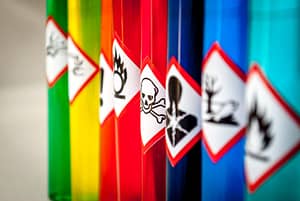The dangers of DCM
Recently the HSE published a series of information sheets which will help those working with Dichloromethane (DCM) in paint stripping and floor laying adhesives to comply with their duties under COSHH Regulations 2002 (as amended) to control exposure to hazardous substances and protect workers’ health.
DCM is a highly volatile solvent. Its vapour is colourless with a low odour so you may be unaware that you are at serious risk.
Breathing in DCM vapour can affect the central nervous system, it is a suspected carcinogen, it can be absorbed through the skin, burn the skin, and is an eye irritant. DCM breaks down to carbon monoxide within the body, which reduces the flow of oxygen. This may aggravate symptoms for those with heart and/or lung problems. At high concentrations, DCM can even cause death.
Other substances likely to be encountered when stripping surface coatings from alloy wheels include hydrofluoric acid, methanol and sodium hydroxide, which are also highly hazardous.
DCM-based products are very hazardous so employers must avoid their use whenever reasonably practicable, by using suitable and safer alternative products or methods.
DCM-based products should ONLY be used in well ventilated areas to prevent the build-up of vapour.
Employers must obtain specialist advice for selecting the right personal protective equipment (PPE). This is because DCM can penetrate through gloves and respirator filters very quickly, therefore they usually only provide protection for a very short time.
For paint stripping at transient workplaces, only those trained and holding an official Certificate of Competence are allowed to use DCM-based paint strippers. A certificate can be obtained from the HSE following the successful completion of training and an online exam. A certificate is not required for the use of DCM-based adhesives, although the risks are similar.
EEUK’s team of Occupational Hygienists can help employers and employees understand the risks, select suitable controls, and undertake exposure monitoring (if deemed necessary).
Please get in touch with us via our website if you need help with DCM https://eeukltd.com/occupational-hygiene/
See the HSE information sheets here: https://www.hse.gov.uk/coshh/essentials/direct-advice/dichloromethane.htm
